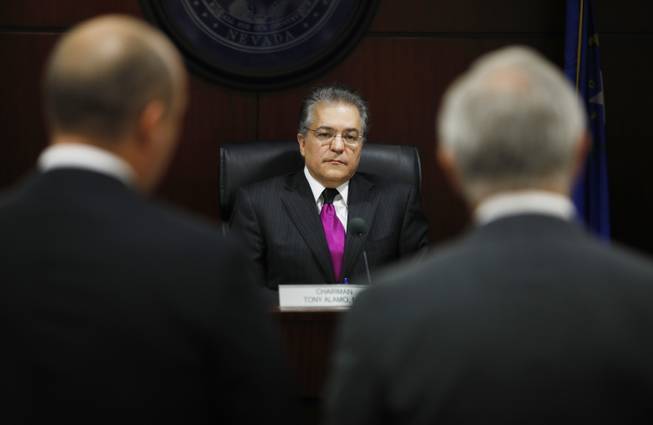
John Locher / AP
Matt Maddox, left, CEO of Wynn Resorts Ltd. and Phil Satre, right, board chairman of Wynn Resorts Ltd., speak before Nevada Gaming Commission Chairman Tony Alamo, Tuesday, Feb. 26, 2019, in Las Vegas.
Friday, April 5, 2019 | 2 a.m.
The Nevada Gaming Commission regulates everything from casinos on the Strip to the row of slot machines at your neighborhood convenience store. Anything deemed a threat to interests of the state or licensed gaming is subject to a fine. Those fines have previously come down for underage gambling, overserving alcohol, illegal bookmaking and more. Under an intricate monitoring system, casinos are encouraged to step in to regulate themselves for the public interest. Here's what you need to know about how it works:
The largest fine
In January, a fine of $20 million was issued to Wynn Resorts for failure to investigate allegations of sexual misconduct against former CEO and company founder Steve Wynn before he resigned. It is the largest fine ever levied by state officials.
In this case, the Gaming Control Board and Wynn Resorts couldn’t come to an agreement, so the matter went to the commission for a final decision.
The fine was paid in early March, according to Nevada's Legislative Counsel Bureau.
The previous high for a gaming fine was issued to CG Technology for $5.5 million in 2014, related to illegal betting infractions.
MGM Resorts International was fined $5 million in 2003 for misappropriation of funds. No other gaming fine in state history has been for more than $3 million.
Prior to the recent large fine, state regulators collected more than $6.7 million in gaming fines during the past three fiscal years combined.
How does the state police the gaming industry?
The Nevada Gaming Control Board, which has three, full-time, governor-appointed board members and nearly 400 staff members, acts in a prosecutorial capacity, policing Nevada’s gaming industry and issuing fines. If a fine agreement cannot be made between the board and the company at fault, the case goes to the Nevada Gaming Commission, which serves in a judicial capacity by determining a potential punishment.
Infractions can be uncovered by enforcement agents working for the board. They can also be provided by tipsters or the organizations themselves in the form of self-reporting.
“The industry is very well-policed, not only by regulators, but by themselves,” Gaming Commission Chairman Tony Alamo said. “That’s a statement of fact. Every so often, we get fines that take over the news. … Rest assured, though, that’s very rare.”
Because gaming license holders want to retain their privileges, they generally want to make sure they’re not breaking the rules, Alamo said.
He says gaming fines of at least $1 million have only been handed down 11 times in the state’s history.
“We’re talking about an industry that’s self-policed better than any other industry we have in the country,” he said. “Look at the EPA or the FDIC—they lower a lot more hammers than we do, because we don’t have to.”
Alamo said license holders often come to the board to ask if certain actions would be violations.
How Nevada spends its general fund money (2017-19)
■ Kindergarten to 12th grade: $2,917,317,412 (36.5%)
■ Health and human services: $2,496,761,841 (31.3%)
■ Higher education: $1,223,599,760 (15.3%)
■ Public safety: $711,464,315 (8.9%)
■ Elected officials: $345,398,162 (4.3%)
■ Commerce and industry: $115,643,915 (1.4%)
■ Infrastructure: $78,128,971 (1%)
■ Finance and administration: $76,005,549 (1%)
■ Special purpose agencies: $21,736,056 (0.3%)
______
Total: $7,986,055,981
Where does the money go?
Gaming-fine money usually goes into the state’s general fund.
At the end of the most recent fiscal year for the state—the 2018 fiscal year ended June 30—the state had about $425 million in its general fund, according to Mark Krmpotic, a fiscal analyst for the Legislative Counsel Bureau.
Gov. Steve Sisolak’s projected budget, which could change depending on what lawmakers do this spring, would leave $262.5 million in the general fund at the end of the current fiscal year, not including some of the more recent fines. Assuming the budget projection holds, which is far from certain, it will get an increase of about 8 percent in general fund monies from recent fines.
“Money from the general fund is used to support state government,” Krmpotic said. “So it partially funds the K-12 [education] system in Nevada, the university system, the Department of Corrections and programs like Medicaid and other health and human services. There are other programs that money supports.”
What can companies be fined for?
Reasons that license holders are fined run the gamut, Alamo said, though a fine usually isn’t levied unless there’s a significant issue. Examples include: taking illegal bets, allowing minors on the casino floor, money laundering, failing to register employees with the state and allowing a banned gambler to wager.
“Fines are for significant issues that call for a change in behavior,” Alamo said. “We could be talking about something found in an audit or something related to behavior.”
Fines can be small and large, some for $1,000 or less.
“There are restricted and non-restricted licensees,” Alamo said. We could be talking about a huge organization … or something like a 7-Eleven with seven machines.”
Can a fine be protested or appealed?
“It’s final,” Alamo said. “I’m not sure if one could potentially file a civil recourse, but it’s never happened. People want to keep their license. It’s not cops and robbers; it’s cops and cops. Both sides really want to get to the same place.”
This story originally appeared in the Las Vegas Weekly.
